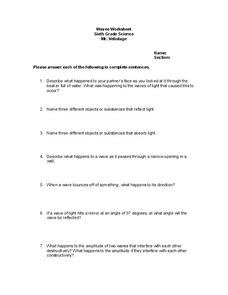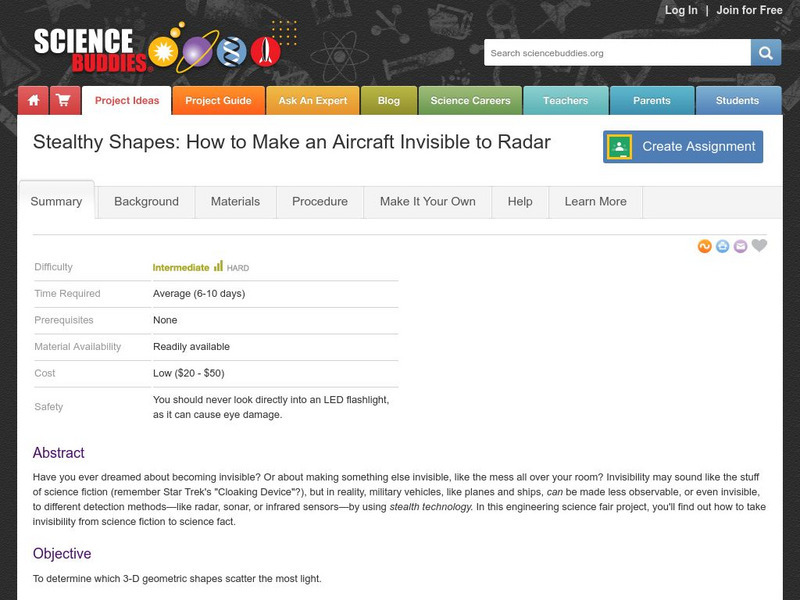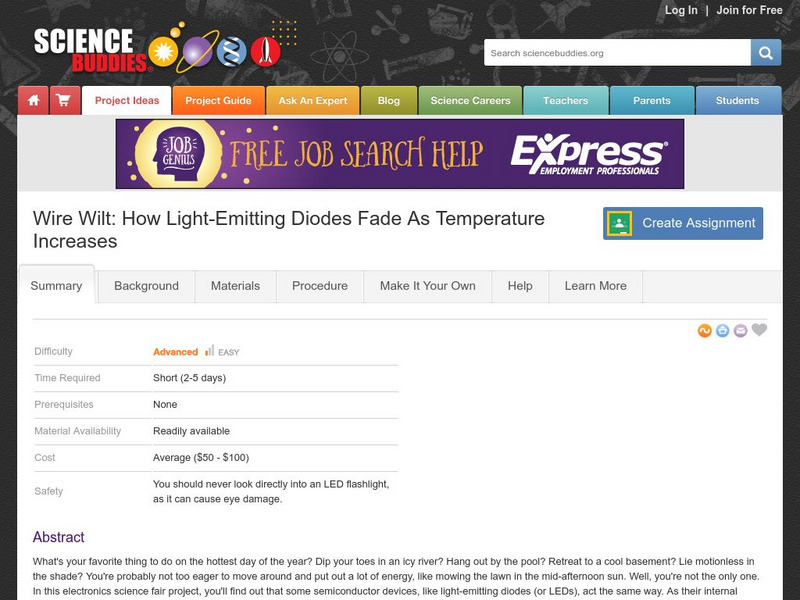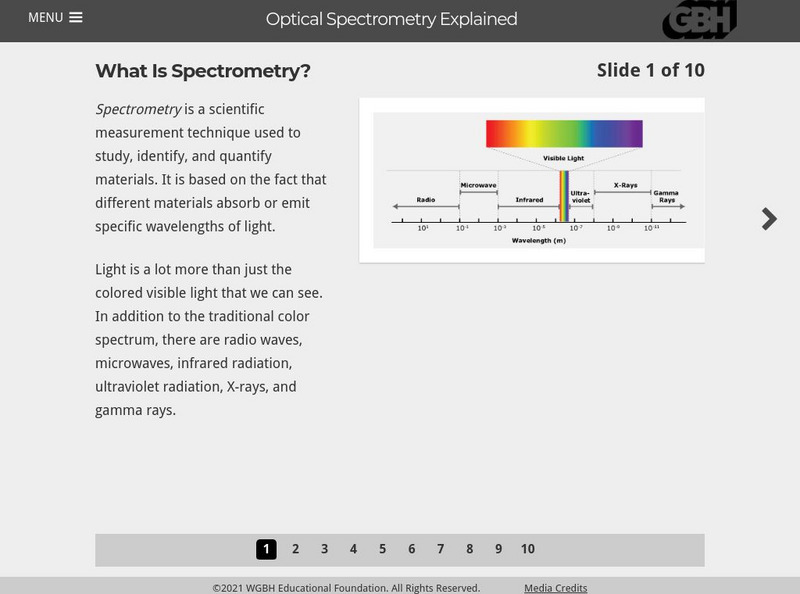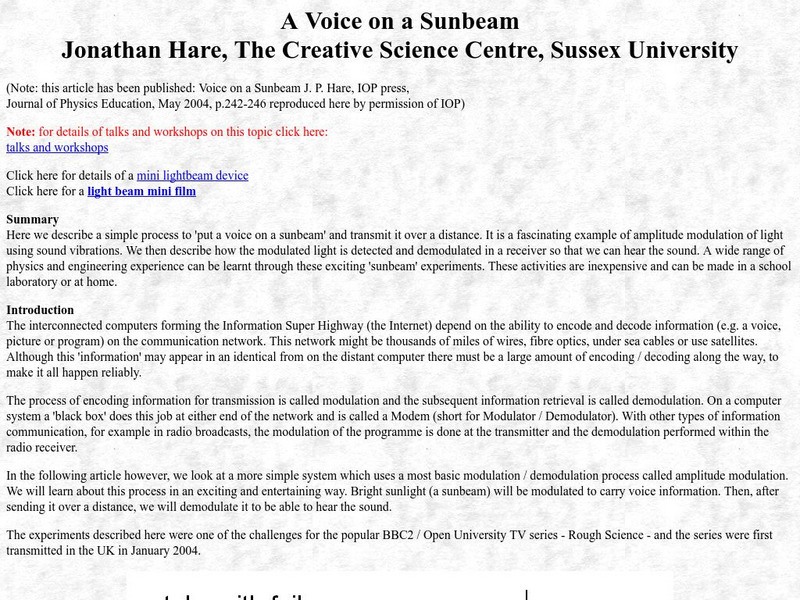Curated OER
The Doppler Effect Lab
In this Doppler effect worksheet, students read information about the Doppler effect. Students answer questions as it relates to the pitch and wavelengths of a demonstration simulates what happens with the Doppler Effect.
Curated OER
Waves Worksheet
In this light waves worksheet, students complete 7 short answer questions where they analyze and record findings about the properties of light waves.
Curated OER
Waves Worksheet #2
In this waves worksheet, students complete 7 fill in the blank questions regarding frequency, speed, amplitude and wavelength and how these properties relate to each other.
Curated OER
Radiation From Space
In this space worksheet, students will review different aspects of light, sound, and radio waves in space and the use of different types of telescopes. This worksheet has 17 fill in the blank statements.
Curated OER
Changing Your View
In this refraction learning exercise, students will explore the property of light called refraction. Students will conduct a quick experiment to understand how light is refracted. Then students will complete 2 short answer questions.
Curated OER
Properties of Light
In this light waves instructional activity, students will measure the wavelength of different light waves and then calculate its frequency. This instructional activity has 9 short answer questions and 10 fill in the blank questions.
Curated OER
Lighting Our Way
Students read a variety of web-based articles to explore the history of human understanding of light. They investigate light waves and read about the work of Albert Einstein.
Curated OER
My World is Upside Down
Students observe a demonstration on light. They construct a pinhole viewer, and explore and discuss the concept that light travels in a straight line.
Curated OER
How Do Waves Transfer Energy?
In this energy transfer worksheet, students will write down the 4 steps in the sequence that shows how waves transfer energy.
Curated OER
Lenses and Mirrors
Students investigate lenses and mirrors showing how they bend and reflect light waves.
Curated OER
Understanding Waves
Students perform 3 hands-on activities to help them explain the terms "crest" and "trough" as related to sound, water, and light waves. All three waves types have troughs and crests. The activities use toys to demonstrate the properties...
Curated OER
Light Waves and Spectroscopes
Students observe continuous and bright line spectra through a simple, inexpensive spectroscope that is suitable for classroom use and work through typical student laboratory exercises.
Georgia State University
Georgia State University: Hyper Physics: Diffraction
This physics department site provides links about the diffraction of light. Each page includes thorough explanations and meaningful graphics. Some pages include interactive problem-solving practice sections.
Georgia Department of Education
Ga Virtual Learning: Optics
Students discover how mirrors affect optics in this module through reading informational text, watching animations, and answering self-checking practice questions.
California Institute of Technology
Spitzer Science Center: Que Es El Infrarrojo?
An excellent resource for Spanish speaking science students. Provides a thorough description of infrared light, what it does and how it is used. Provides excellent pictures depicting actual use.
Science Buddies
Science Buddies: Project Ideas: How to Make an Aircraft Invisible to Radar
In this engineering science fair project, students will determine which 3-D geometric shapes scatter light the most. The Science Buddies project ideas are set up consistently beginning with an abstract, objective, and introduction,...
Science Buddies
Science Buddies: Wire Wilt: Light Emitting Diodes Fade as Temperature Increases
In this electronics science fair project, students will investigate how the output of an LED flashlight changes as its temperature increases.
University of Colorado
University of Colorado: Physics 2000: Cat Scans: Projecting Shadows
This page and the three pages which follow discuss how X-ray technology can be used to produce an image of the human body. Discussion is understandable and highly intriguing. Several interactive animations allow the visitor to explore...
University of Colorado
University of Colorado: Physics 2000: Quantum Atom
Several pages with an interesting discussion of the visible light spectrum and atomic absorption and emission line spectrum. Features excellent graphics, thorough and understandable discussion, and many interactive Java applets.
University of Colorado
University of Colorado: Ph Et Interactive Simulations: Blackbody Spectrum
How does the blackbody spectrum of the sun compare to visible light? Learn about the blackbody spectrum of the sun, a light bulb, an oven, and the earth. Adjust the temperature to see the wavelength and intensity of the spectrum change....
PBS
Pbs Learning Media: Spectrometry Explained
This interactive tutorial illustrates how spectrometry is used to study, identify, and quantify materials.
Creative Science Centre
Creative Science Centre: A Voice on a Sunbeam
Here is described a simple process to 'put a voice on a sunbeam' and transmit it over a distance. It is a fascinating example of amplitude modulation of light using sound vibrations. It then describes how the modulated light is detected...
PBS
Pbs: Rough Science
Website companion to PBS show, "Rough Science," in which five scientists use their collective expertise to complete a series of tasks. Follow the scientists as they do things like generate electricity, make soap, make antibacterial...
NASA
Nasa: The Space Place: Why Is the Sky Blue?
Learn about colors of light by exploring how prisms work. Discover the different colors of the spectrum and how the visible light is what we see.



